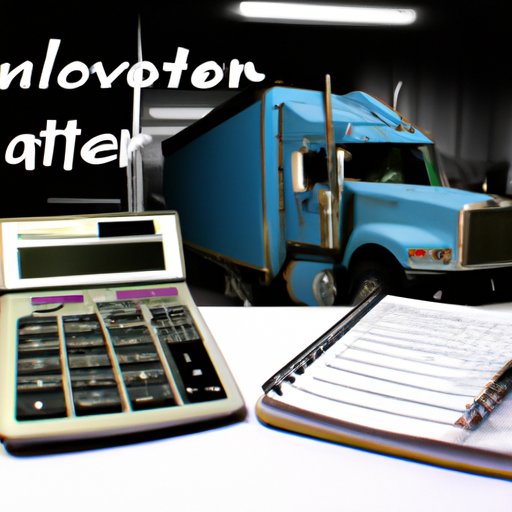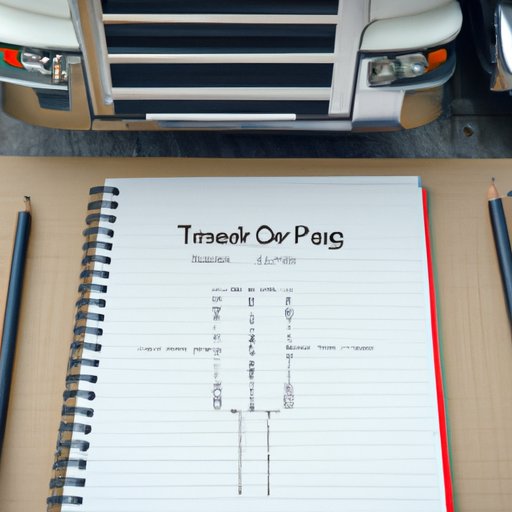Introduction
If you’re considering starting a trucking business, you’re in luck. There are many opportunities available for entrepreneurs who are willing to invest time and money into launching their own trucking companies. However, there is also a great deal of competition, so it’s important to do your research and develop a comprehensive plan before diving in.
This article will provide an overview of how to start a trucking business, including key steps such as researching your options, creating a business plan, obtaining licenses and permits, acquiring equipment, finding customers or brokers, understanding legal requirements, and calculating startup costs. With this information, you’ll be well on your way to becoming a successful trucking business owner.
Outlining the Steps to Starting a Trucking Business
The process of starting a trucking business can seem overwhelming at first, but by breaking it down into smaller tasks, you can make it more manageable. Here are the key steps you should take when starting a trucking business:
Research Your Trucking Options
Before you jump into the trucking business, you should take some time to research the different types of trucking operations and decide which one is right for you. Do you want to specialize in hauling hazardous materials? Or maybe you’d prefer to focus on local deliveries? Understanding the different types of trucking services can help you determine which one is best suited to your goals and capabilities.
Create a Business Plan
Once you’ve decided on a type of trucking business to pursue, it’s time to create a business plan. Your plan should include detailed information about your business, such as your target market, pricing structure, marketing strategies, and operational procedures. Additionally, make sure to include financial projections and a timeline for launching your trucking business.
Obtain Licenses and Permits
Most states require commercial trucking businesses to obtain certain licenses and permits before they can operate. These may include a Department of Transportation (DOT) number, motor carrier permit, and fuel tax license. Make sure to check with your state’s licensing office to find out what licenses and permits you’ll need to obtain.
Acquire Equipment
Once you’ve taken care of the paperwork, you’ll need to purchase the necessary equipment to run your trucking business. This includes trucks, trailers, and other vehicles, as well as computers, software, and other tools. You’ll also need to buy supplies such as fuel, tires, and maintenance parts. Make sure to budget for these expenses when calculating your startup costs.
Find Customers or Brokers
Next, you’ll need to find customers or brokers who are willing to hire your trucking services. You can do this through networking, cold calling, or online marketing. Additionally, you should consider joining a trucking association or freight broker network, which can help you find potential clients.
Consider the Legal Requirements for Operating a Trucking Business
In addition to the licenses and permits mentioned above, there are several other legal requirements you must follow when operating a trucking business. The following are some of the most important ones to be aware of:
Learn About DOT Regulations
The Federal Motor Carrier Safety Administration (FMCSA) sets rules and regulations for commercial trucking operations. These regulations cover everything from vehicle safety to driver qualifications to recordkeeping. Make sure you familiarize yourself with these regulations and ensure that your business is compliant.
Understand Insurance Requirements
Commercial trucking businesses must carry certain types of insurance, such as cargo insurance, general liability insurance, and workers’ compensation insurance. Make sure to research the insurance requirements for your state and purchase the necessary coverage for your business.
Familiarize Yourself with Tax Laws
Lastly, you’ll need to understand the tax laws that apply to trucking businesses. This includes income taxes, fuel taxes, and other taxes that may be applicable to your operation. Make sure to consult a tax professional to ensure that you’re in compliance with all relevant tax laws.

Research the Costs of Starting a Trucking Business
Before you start your trucking business, you’ll need to calculate the total cost of getting it up and running. This includes both startup costs and ongoing expenses. Here are the key factors to consider when estimating the cost of your trucking business:
Calculate Startup Costs
Startup costs include things like licenses, permits, equipment, supplies, and any professional services you may need. To estimate these costs, create a spreadsheet listing all of the items you’ll need to purchase and the associated costs. Once you have a total, you can adjust your budget accordingly.
Budget for Ongoing Expenses
In addition to startup costs, you’ll need to budget for ongoing expenses such as fuel, maintenance, insurance, and payroll. Make sure to factor these costs into your budget so that you’re not caught off guard later on.
Estimate Potential Profits
Finally, you’ll need to estimate the potential profits of your trucking business. This involves calculating your expected revenues and subtracting all of your expenses. For example, if you expect to generate $100,000 in revenue and have $50,000 in expenses, then your estimated profit would be $50,000.

Calculate the Profitability of Your Trucking Business
Once you’ve calculated the costs of starting your trucking business, you’ll need to analyze the potential profitability of the venture. This involves estimating your operating costs, analyzing your target market, and comparing your revenues and expenses. Here are the steps you should take:
Analyze Your Market
Before you launch your trucking business, you should conduct market research to determine the size and growth potential of your target market. For example, you can research the number of trucking companies in your area, the types of services they offer, and the prices they charge. This information can help you identify potential opportunities and challenges.
Estimate Operating Costs
Next, you’ll need to estimate your operating costs, such as fuel, maintenance, and payroll. Make sure to include all of the costs associated with running your business, such as insurance, taxes, and rent. This information can help you determine whether your business will be profitable.
Compare Revenues and Expenses
Finally, compare your estimated revenues and expenses to determine the potential profitability of your trucking business. If your revenues exceed your expenses, then your business is likely to be profitable. If not, you may need to adjust your budget or find ways to reduce your operating costs.

Develop a Plan for Your Trucking Business
Once you’ve calculated the costs and estimated the profitability of your trucking business, it’s time to develop a plan for launching and managing the venture. Here are some key steps to take:
Identify Objectives
First, you’ll need to identify your objectives for the trucking business. This includes setting short-term and long-term goals, such as increasing sales or expanding your fleet. Make sure to be realistic and set achievable goals so that you can measure your progress.
Plan Your Financial Strategy
Next, you’ll need to develop a financial strategy for your trucking business. This includes budgeting for expenses, developing pricing structures, and setting up systems for tracking revenues and expenses. Additionally, make sure to set aside funds for unexpected costs and contingencies.
Set Up Management Systems
Finally, you’ll need to set up management systems for running your trucking business. This includes establishing operational procedures, hiring and training staff, and developing systems for tracking customer orders. Additionally, make sure to stay up-to-date on industry trends and regulations to ensure that your business remains compliant.
Conclusion
Starting a trucking business can be a lucrative venture, but it requires careful planning and research. This guide outlined the steps you should take to get your business off the ground, from researching your options to calculating startup costs. With this information, you’ll be well on your way to becoming a successful trucking business owner.
(Note: Is this article not meeting your expectations? Do you have knowledge or insights to share? Unlock new opportunities and expand your reach by joining our authors team. Click Registration to join us and share your expertise with our readers.)
